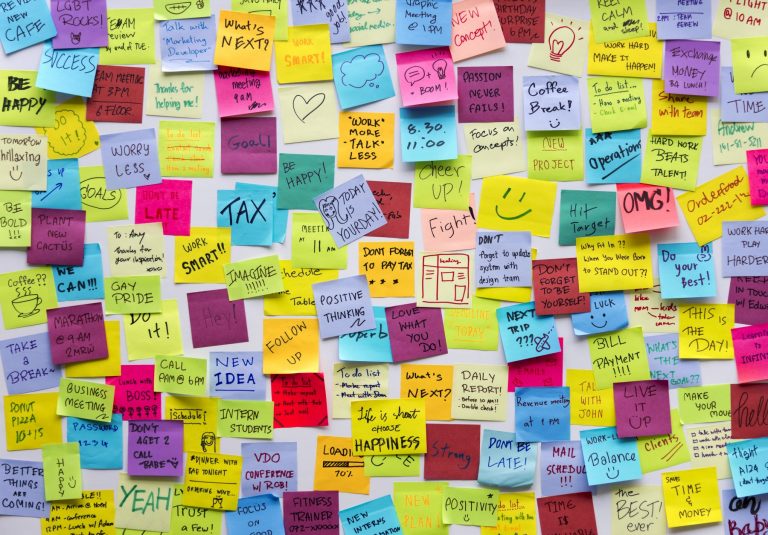As a productivity expert, author, podcaster and coach, Tonya Dalton knows a thing or two about hacking through a massive to-do list. As a wife, mother, teacher and regular human being, she also knows that plowing through a mile-long to-do list is a surefire path to burnout. This led her to launch her company, inkWELL Press, and develop her liveWELL method of productivity.
Dalton has spent the last five years building out her productivity and coaching company, inkWELL Press. Born out of her passion for teaching and getting things done, the company has allowed Dalton to share her well-honed tips and tricks with others through her courses and her popular Productivity Paradox podcast.
Her recently published book, The Joy of Missing Out, compiles the core tenets of her counterintuitive approach to getting things done. If you’re looking for a guru with the answers to getting 10 times the work finished in the same 24 hours you’ve always had, however, Dalton isn’t for you. In fact, she isn’t even interested in helping you get more done — just in getting more important things done.
Dalton’s ground-up approach to productivity teaches readers to identify their real priorities and, in doing so, cut their massive to-do lists down to size by learning to say no to the tasks that pull them away from their North Star (her term for the overarching mission you’re out to accomplish).
We sat down with Dalton to chat about why less is actually more when it comes to getting things done and how to change your definition of productivity to be more satisfied with your life.
On the problem of always “being busy”
GRATEFUL: As I was reading your ideas about being overwhelmed, I immediately thought about how it feels like saying you’re “busy” has almost become a form of currency in society. It’s like a badge of honor to be busy now, and it seems like being overwhelmed is the natural flip side or progression of that. Like, if someone asks how you are, the Instagram answer is, “I’m busy,” but if your sister or your best friend asks how you’re doing, the answer is, “I’m overwhelmed.”
Tonya Dalton: It’s the same thing, but one is a little more honest and raw and real. There really is this whole badge of honor that somehow if I’m busy, I must be doing something and, therefore, I am important.
How do I feel about myself if I’m not busy? Am I failing? I find that people, when they have like 10 minutes to themselves, they’re like, “Oh my gosh, what did I do wrong? How do I have this space for myself?” And there is this whole glorification of busy in our society — you know, T-shirts and posters all about being so busy. So we think we’re supposed to be busy, but being busy just means you’re chasing your tail, you’re running around in circles, not sincerely doing the work that fulfills you. You’re filling your calendar, but are you filling your soul? Because that’s really what we want.
Every day, we want to do a little bit of work that’s satisfying. That’s working toward our North Star mission or core values. Something that’s working us toward the ultimate goal, toward the ideal life. That’s when we feel satisfaction in our day and stop thinking, “Why didn’t I get more done? I didn’t do enough.”
MORE: How neuroscientists says you can hack your brain to create more happiness
On finding your yes
GRATEFUL: I feel like that’s the key takeaway of the book, and it’s apparent in the title, The Joy of Missing Out, the idea that being productive is really about prioritizing and it’s not about getting a thousand things done. It’s about getting the right things done.
TD: Exactly. It’s not about saying no. It’s finding your yes. People are always saying to me, “Oh, you’re so busy.” Stop putting that on me. I’m not busy. I’m doing what’s important to me. I’m prioritizing. I don’t feel overwhelmed. I don’t feel stressed. I feel excited. There’s the whole idea that you must be busy if you’re successful, but what are we really looking for in life? Every desire, every goal, every dream that anyone has, no matter what it is, it’s steeped in happiness. And when we do things that get us closer to what’s really important to us, there’s happiness there. To grab a little more happiness per day, we just have to clean out the clutter and the noise.
GRATEFUL: At what point did the concept of a few priorities over a massive to-do list really hit home with you personally?
TD: There was this moment when I was growing my first business and stirring a pot of spaghetti sauce and my two kids were playing on the floor and I heard the garage door open up. So, at this point, I know my husband is home and the relief is coming in. And I’m sitting there, I’m stirring this pot of spaghetti and he doesn’t come in. And he doesn’t come in. And he doesn’t come in. And at that point, it’s been like four minutes and with each minute the steam is starting to come out of my ears, right? So I stomp over to the garage and at this point, I’m angry, irritated, and I open the door and I see him sitting in his car listening to some bit on the radio, laughing along with it, having a great time.
And I was furious. I was so mad and I thought to myself, “How dare you? How dare he give himself this five minutes to laugh in the car? I would never do that.” And then I was like, “Wow. I wouldn’t give myself five minutes to enjoy myself. Five minutes to transition from work to home life.” For me, that was the moment where I realized I had to change.
On self-compassion
GRATEFUL: That reminds me of a concept that counselors and therapists often teach, which is the importance of self-compassion and to talk to yourself like you would talk to a close friend who was dealing with the issue you’re thinking about.
TD: Can you imagine if I yelled at him like that? It’s kind of insane. We talk to and treat ourselves so harshly, when we need to give ourselves grace and flexibility because life is messy, and that’s a beautiful thing. We need to embrace that we are perfectly imperfect and that is what makes us amazing.
On finding your core values
GRATEFUL: One of the most impressive things about your system is how you really break down the process of identifying your core values into a step-by-step method. How were you able to boil down such a huge concept like that?
TD: When we’re thinking about our mission, our vision, our core values, think about who we were when we were kids. What did we want to be? Why did we want to be that? Not just what did you want to be? “I want to be a policeman.” But why? “I wanted to help.” Why did you want to help people? There was a whole underlying reason why you wanted to be what you wanted to be and why you enjoyed the things you enjoyed — back when you did things because you wanted to do them and not because you should do them.
On writing about productivity for women
GRATEFUL: Your book is geared specifically toward women. Can you talk about why you wanted to write something that was geared directly toward women?
TD: If you look at productivity books that are out there, the authors are David [Allen, author of Getting Things Done], Stephen [Covey, author of The 7 Habits of Highly Effective People], Tim [Ferriss, author of The 4-Hour Work Week]. The list of names is all men, right? This is one of the first productivity books written for women by a woman. I lean into the things that women do, like feeling bad about taking care of ourselves. A lot of perfectionism is much stronger in women than it is in men, and it’s a lot of all things that we deal with emotionally. I wanted to be able to address those with productivity and the concept of being able to compartmentalize your life and your to-do list and your buckets and to understand that balance doesn’t mean balance every moment of every day. It’s much wider and much broader.
On her definition of balance
GRATEFUL: That’s so true. And in the book, you talk about the idea of having different buckets and purposefully not balancing them all the time. Can you talk more about that?
TD: The whole idea of balance — no one asks a man, when he has kids, are you coming back to work? But people ask women that question all the time, and it’s kind of a loaded question. So this whole idea of balance — I feel like even more so with homework starting to increase for men, which I think is great and I’m loving — I’m absolutely loving that society has stopped portraying dads as bumbling idiots, because our husbands are supposed to be our partners, and they should be taking on their equal share.
So I wanted, in the book, to be able to address those unique things that we as women do because when I look at productivity books that are written for men, they are from a very different perspective and they’re just not holistic. I truly believe that we need to be productive in our home life because we have that solid foundation. We can be our best selves at work, but if life is falling apart, we can’t go to work and do our jobs.
GRATEFUL: I know the book is definitely written for a female audience, but do you also have a lot of men who are also engaging with your liveWELL method? If so, what has their response been to the book?
TD: Oh, absolutely. Just as we [as women] have taken all those productivity books for men and applied them to ourselves, men are using this system too. I’m more than happy when men start using the system or they show up in my Facebook group or they’re taking the course. I really embrace that because it totally does work for them.
I just got a message from somebody who was telling me that her husband is starting to use the escalate, cultivate and accommodate method, and he said it totally changed his world at work. And she loves that he’s using it and now they’re using the same language with each other.
MORE: I tried 6 happiness hacks backed by science — here’s what actually worked
On the importance of choice
GRATEFUL: What are the biggest takeaways from The Joy of Missing Out? If someone got through the book and only remembered one of your principles or concepts, which one would you want to stick with them?
TD: Life is full of choices. We don’t think we have choices. We don’t think we have ownership over our day and of the choices that power it. When we start to see those choices, I feel like the doors start opening up wide open. We let that fresh air in and we’re really able to fully breathe and be what we want to be. If nothing else, you have choices and every day you’re making choices whether you realize that or not. So let’s choose to live a life of attention. Let’s live a life of purpose. Let’s make those choices even when we don’t think we have them.
Looking for a new hobby to unwind in your down time? Check out our comic book drawing tutorial.









